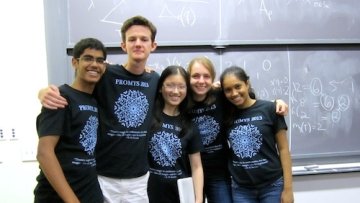We are delighted to annouce that PROMYS Europe will take place in Oxford in July and August of this year. Building on the hugely successful PROMYS programmes in the USA, PROMYS Europe is a challenging programme designed to encourage mathematically ambitious secondary school students to explore the creative world of mathematics. PROMYS is about asking and answering challenging questions, hard work and experiencing the sheer pleasure and beauty of mathematics.
Model theory and the distribution of orders in number fields
Abstract
Algebraic-geometric aspects of constructing G2 manifolds as connected sums
Abstract
I will speak about weak Fano 3-folds, K3 surfaces and their Picard lattices, and explain how to solve the matching problem in various situations.
Choking of flow through a poroelastic material
Abstract
Flow thought a porous media is usually described by assuming the superficial velocity can be expressed in terms of a constant permeability and a pressure gradient. In poroelastic flows the underlying elastic matrix responds to changes in the fluid pressure. When the elastic deformation is allowed to influence the permeability through the elastic strain, it becomes possible for increased fluid pressure gradient not to result in increased flow, but to decrease the permeability and potentially this may close off or choke the flow. I will talk about a simple model problem for a number of different elastic constitutive models and a number of different permeability-strain models and examine whether there is a general criterion that can be derived to show when, or indeed if, choking can occur for different elasticity-permeability combinations.
Expander parallel $\ell_0$ decoding
Abstract
We present an algorithm, Parallel-$\ell_0$, for {\em combinatorial compressed sensing} (CCS), where the sensing matrix $A \in \mathbb{R}^{m\times n}$ is the adjacency matrix of an expander graph. The information preserving nature of expander graphs allow the proposed algorithm to provably recover a $k$-sparse vector $x\in\mathbb{R}^n$ from $m = \mathcal{O}(k \log (n/k))$ measurements $y = Ax$ via $\mathcal{O}(\log k)$ simple and parallelizable iterations when the non-zeros in the support of the signal form a dissociated set, meaning that all of the $2^k$ subset sums of the support of $x$ are pairwise different. In addition to the low computational cost, Parallel-$\ell_0$ is observed to be able to recover vectors with $k$ substantially larger than previous CCS algorithms, and even higher than $\ell_1$-regularization when the number of measurements is significantly smaller than the vector length.
Fast and well-conditioned spectral methods for D-finite functions
Abstract
D-finite functions are solutions of linear differential equations with polynomial coefficients. They have drawn a lot of attention, both in Computer Algebra--because of their numerous (algorithmic) closure properties--but also in Numerical Analysis, because their defining ODEs can be numerically solved very efficiently. In this talk, I will show how a mix of symbolic and numerical methods yields fast and well-conditioned spectral methods on various domains and using different bases of functions.
Singular Fibers and Coulomb Phases
Abstract
I will discuss how singular fibers in higher codimension in elliptically fibered Calabi-Yau fourfolds can be studied using Coulomb branch phases for d=3 supersymmetric gauge theories. This approach gives an elegent description of the generalized Kodaira fibers in terms of combinatorial/representation-theoretic objects called "box graphs", including the network of flops connecting distinct small resolutions. For physics applications, this approach can be used to constrain the possible matter spectra and possible U(1) charges (models with higher rank Mordell Weil group) for F-theory GUTs.
Calabi-Yau Manifolds with Small Hodge Numbers
Abstract
This is a report on an ongoing project to construct Calabi-Yau manifolds for which the Hodge numbers $(h^{11}, h^{21})$ are both relatively small. These manifolds are, in a sense, the simplest Calabi-Yau manifolds. I will report on joint work with Volker Braun, Andrei Constantin, Rhys Davies, Challenger Mishra and others.
Tree-Level S-Matrices: from Einstein to Yang-Mills, Born-Infeld, and More
Abstract
In this talk I am going to discuss our recent and on-going work on an integral representation of tree-level S-matrices for massless particles. Starting from the formula for gravity amplitudes, I will introduce three operations acting on the integrand that produce compact and closed formulas for amplitudes in various other theories of massless bosons. In particular these includes Yang-Mills coupled to gravity, (Dirac)-Born-Infeld, U(N) non-linear sigma model, and Galileon theory. The main references are arXiv:1409.8256, arXiv:1412.3479.


